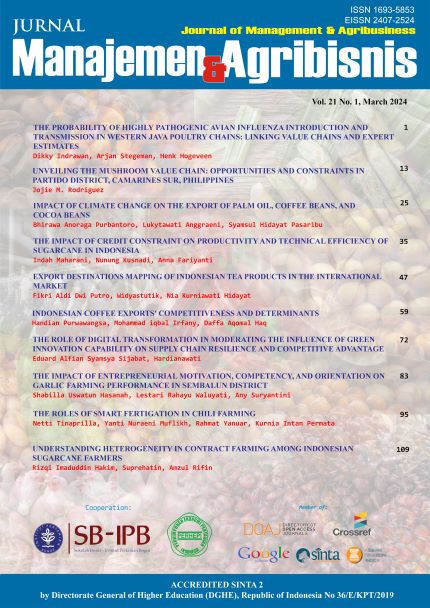Abstract
Indonesia's reliance on soybean imports due to inadequate domestic production, understanding the multifaceted influence of macroeconomic conditions on soybean imports, and analyzing the factors driving import decisions alongside the effectiveness of existing import policies in ensuring supply security and promoting domestic production. Data collection consists of secondary data obtained from several sources such as the Ministry of Trade (KEMENDAG), the World Bank and UN Comtrade. The data analysis method used are descriptive and panel data regression analysis with the Gravity model. The result of the level soybean import that the United States occupies the first position as the largest soybean exporting country to Indonesia. The share of US soybean exports is very large in Indonesia, reaching 72% of all soybean imports in Indonesia.The results of the panel data regression analysis show that the variable of import tariff, import price and import restriction dummy significantly affect with importing value of Indonesian soybean in the world trade. In addition, exchange rate and economic distance don’t significantly affect with importing value soybean. Implementing Indonesia's soybean policy is expected to help achieve soybean self-sufficiency and reduce dependence on soybean imports from soybean producing countries in the world. The Indonesian government has issued policies namely expanding land, providing superior seeds and technology. The domestic government needs to implement a protection policy by implementing an entry tariff policy.
Keywords: soybean Indonesian, international trade, affecting imports, policy soybean, policy implementation
Authors
Authors who publish with this journal agree to the following terms:
- Authors retain copyright and grant the journal right of first publication with the work simultaneously licensed under a Creative Commons Attribution License that allows others to share the work with an acknowledgement of the work's authorship and initial publication in this journal.
- Authors are able to enter into separate, additional contractual arrangements for the non-exclusive distribution of the journal's published version of the work (e.g., post it to an institutional repository or publish it in a book), with an acknowledgement of its initial publication in this journal.
- Authors are permitted and encouraged to post their work online (e.g., in institutional repositories or on their website) prior to and during the submission process, as it can lead to productive exchanges, as well as earlier and greater citation of published work (See The Effect of Open Access).

